Tehran University Students Hold Rallies To Protest Closure Of Dorms and Classes
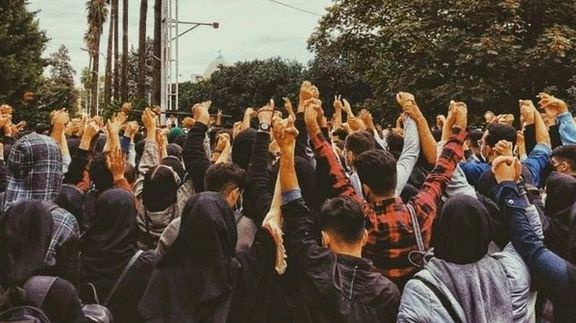
Students at Tehran University have held a rally against closures of dorms and classes which will now be held online until April.

Students at Tehran University have held a rally against closures of dorms and classes which will now be held online until April.
Protests on Monday afternoon saw male and female students across the campus chanting “in-person education is our absolute right”, in addition to calling on Mohammad Moghimi, the Dean of the university to resign.
The news was announced by Mahmoud Kamarei, the university’s vice President was said that the student accommodation will not be available from March 16 to April 7, with the closures of facilities such as canteens during the same period.
The country’s Student Union Council claims "the authorities are afraid of the presence of students in the university and that the lack of budget is a false excuse for closing the universities in the second semester”.
Iran's universities were one of the main centers of protests during the nationwide uprising against the regime following the death of Mahsa Amini in police custody. In order to suppress the protests, the security force of the Islamic Republic repeatedly attacked the universities and arrested over 700 students.
A large number of students have also been banned, expelled and suspended by university administrators.
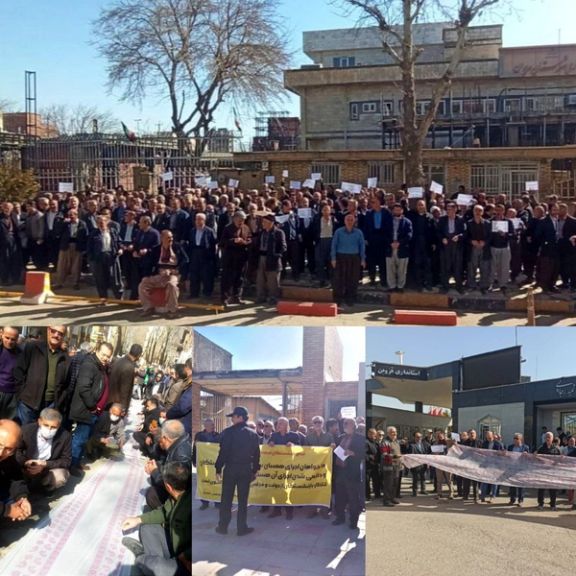
A group of Iranian retirees have held gatherings in front of the governorate buildings in several cities across the country calling on the government to resolve their problems.
In the capital Tehran, regime forces attacked the gathering of retirees. In the cities of Yazd, Sanandaj, Shahrekord, Kermanshah, Marivan, Ardebil, Ilam, Arak, Qazvin, Rasht, Esfahan, Tabriz, Kerman and Sari the retirees chanted slogans like "Costs are in dollars, pensions are in rials", "Expenses, inflation are taking people's lives", and "Incompetent government, resign, resign".
The nationwide gatherings were held to protest the poor living conditions and regime’s failure to increase payments for the retirees.
According to trade union organizations, in Tehran, pensioners gathered in front of the parliament, but the security forces dispersed them.
Eyewitnesses say, “the situation was very tense, and the forces physically assaulted the protesters.”
According to the Coordination Council of Iranian Teachers' Trade Associations, the security forces violently arrested several people in front of the parliament.
On Monday, Telecommunications retirees also gathered in Esfahan, Sanandaj, Arak, Bandar Abbas, Kermanshah, and Khorramabad to protest the government’s inattention to their demands as inflation soars and their pensions remain unchanged.
Iran witnessed another wave of daily protests and strikes since Saturday, as its currency sank leaving ordinary people to wonder how they can afford minimum necessities.
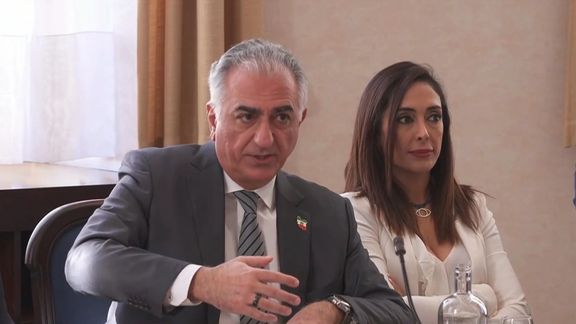
Exiled Prince Reza Pahlavi, who has been very active in recent days touring Europe and advocating the “revolution in Iran,” is in Belgium for a European parliament event.
He arrived in the Belgian capital Brussels on Tuesday and was welcomed by the Swedish Member of the European Parliament Charlie Weimers, one of his hosts in a Wednesday event, titled “A secular, democratic Iran: implications for Europe's economy and security.”
The former Crown Prince held meetings with Belgian lawmakers from different parties at the country’s parliament later in the day.
According to Iran International’s correspondent in Brussels, Bardia Afshin, Pahlavi was asked to talk about his cooperation with other prominent dissident figures and his negotiations with diplomats and officials of other countries meant to garner support for the current protests in Iran, which have been going on for over six months and have been described as the boldest challenge the Islamic regime has faced so far.
During the event at the Belgian parliament, Pahlavi said that the global society should feel comfortable with the alternative to the Islamic Republic, noting that the sooner the transition happens, the sooner the sanctions can be removed and Iran can have foreign investment. He also briefed the lawmakers of the opposition’s ideas for the interim government, which will have specialized committees for different tasks that should be performed during the transition period until a referendum is held in the country.
Pahlavi spoke about the charter of solidarity and freedom of Iran, reiterating that it creates the basis of cooperation among opposition forces to oust the Islamic Republic. "Iran's Charter of Solidarity and Freedom", which is being finalized, includes the minimum principles of agreement for the majority of secular democratic forces. The exiled prince also said that the content of the charter is coordinated with the activists and protesters inside the country to reflect their views and visions for the future of Iran. He said the charter is composed of voices coming from inside the country.
Pahlavi also mentioned jailed lawyer and activist Nasrin Sotoudeh and civil and human rights activist Narges Mohammadi, as well as Fatemeh Sepehri, another activist opposed to the Islamic Republic, as being among the people whose ideas were considered in the charter.
In their historic joint event in Washington on February 10, eight prominent opposition figures held a joint forum, signaling the emergence of a leadership council in the diaspora to campaign for international support in favor of Iran’s protest movement. They also called for support from democratic countries to change the regime in Iran and establish democracy.
On Wednesday, Weimers and Czech MEP Tomáš Zdechovský will host Pahlavi at the European Parliament for the first time where he is scheduled to deliver a keynote speech. His visit to Belgium is the latest leg of his European tour packed with meetings aimed at strengthening support for the newly formed Iranian democratic opposition in EU institutions and pushing for sanctions against the Revolutionary Guards – the IRGC.
Earlier in the month, more than 20,000 Iranians held a protest rally outside the European Council in the Belgian capital, to call on the European Union countries to designate the IRGC as a terrorist organization. Thousands of Iranians from all over Europe held a massive rally in Strasbourg in January to pressure the European countries to list the IRGC.
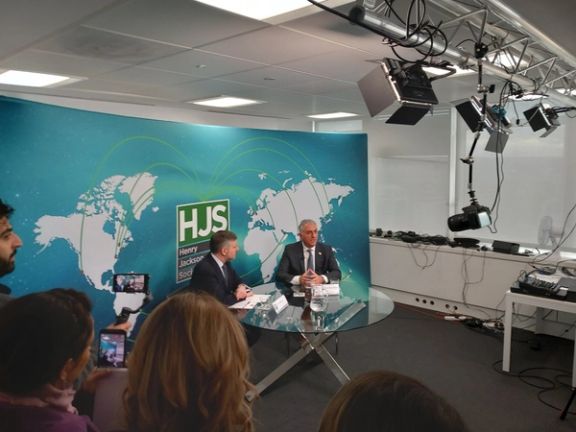
Before Brussels, he was in London, where he attended events at the Oxford Union and the Henry Jackson Society as well as the House of Commons. Hundreds of Iranians had come from across the UK packing the streets of Oxford on Monday, February 27, to catch a glimpse of the son of Mohammed Reza Pahlavi, the last Shah of Iran. Amid a low police presence, there was a carnival-like atmosphere, with people holding red roses as a sign of respect for the prince. His supporters hope one day he will be the King in a constitutional monarchy.
Before the Iranian Revolution in 1979, he was the heir apparent to Iran’s 2,500-year-old throne, but he has repeatedly announced that he is not seeking the throne and people should vote if they want a Republic or a monarchy.
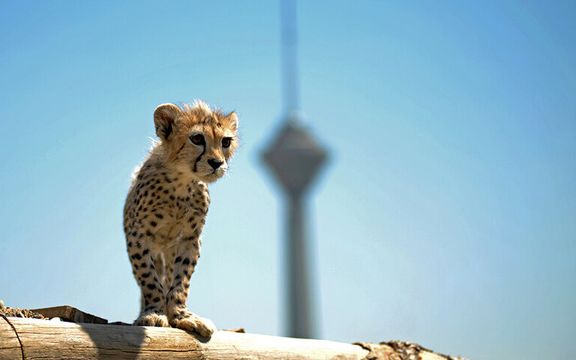
Iranians are sad and angry over the death of Pirouz, the last surviving Asiatic cheetah cub born in captivity in Iran that had become a symbol of hope for ongoing protests.
Pirouz, who died in the early hours of Tuesday due to kidney failure, became one of the icons of the current wave of protests against the regime after Grammy award winning singer-songwriter Shervin Hajipour mentioned his possible extinction in the revolution song ‘Baraye.’
Before its award for Best Song for Social Change at the Grammys 2023, Shervin’s song had become a viral sensation among millions of Iranians, who are protesting against the Islamic Republic for nearly six months now. The word ‘baraye,’ which means “for the sake of”, is repeated at the start of every line of the song, which is composed of a collection of tweets by Iranians bemoaning the situation in their country: “For dancing in the streets; for the fear of kissing; for Pirouz and its possible extinction”, and “for women, life, freedom”.
Doctors at Tehran’s Central Veterinary Hospital began dialysis procedures on Monday night but could not save the cub. “I apologize to the people on behalf of myself and all my colleagues because we couldn’t keep Pirouz alive,” said Amir Moradi, the head of the hospital, in a video message.
Pirouz’s two other siblings had died in May 2022. The second offspring of the Asiatic cheetah, called Iran, died apparently due to problems caused by poor quality milk just two weeks after the first cub from the litter died, purportedly due to “congenital malformation of the left lung”. Their deaths drew widespread criticism, prompting Iran’s Department of Environment to set up a fact-finding taskforce to assess any shortcomings and negligence in dealing with the reproduction process. No findings were announced by the taskforce.
The cubs were born in the Touran Wildlife Refuge by caesarean section on May 1, in what the department said was the first birth of an Asiatic cheetah in captivity. Iran is the last country in the world where the critically endangered Asiatic cheetah can be found in the wild, where authorities launched a United Nations-supported protection program in 2001. In January, deputy environment minister Hassan Akbari said only a dozen individuals were left in the wild -- down from an estimated 100 in 2010.
Social media has exploded with photos and artworks created for Pirouz. People are also re-sharing a video showing Pirouz’s last moments in hospital. Many people blame the authorities for a lack of care, but some believe that the negligence was intentional as Pirouz -- literally meaning Victor in Persian -- had become a symbol of triumph for the ongoing protests. Pro-regime hardliners had earlier called for changing the name of the cub to a religious one.
As hashtags about Pirouz have become trendy on social media, some people and activists used the opportunity to speak about the environmental conservationists jailed in the country since 2018, condemning the regime for imprisoning the most efficient and erudite scientists.
“Wasn’t it enough for you that you detained the best wildlife scientists whose goal was to protect the cheetahs in their habitat?” asked Majid Ghazanfari, a conservationist and former TV presenter that left the state broadcaster in support of the protests, slamming the authorities for their inefficient project for reproduction in captivity. There are reports in media that the Pirouz’s mother, Iran, is pregnant again.
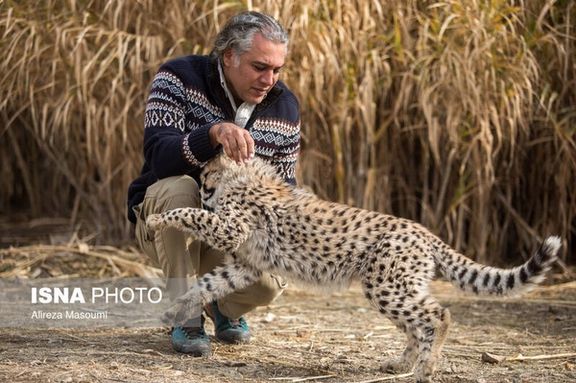
Iranian sociologist Mohammad Fazeli tweeted that reactions to Pirouz’s death indicates that people have become more sensitive about environmental issues. Let's express similar sensitivity for the death of water bodies, soil erosion, destruction of the forests and extinction of Zagros oak trees, constructions in the northern forests, pasture erosion, and other destructive projects and anti-environmental economy, he said, adding, “Pirouz died, long live environmental awareness and sensitivity!”
Earlier in the month, Etemad daily reported that while the Islamic Republic has launched wide-scale propaganda regarding the conditional release of some political prisoners, there has been no amnesty for environmental activists. According to the report, there are still seven environmental activists behind bars while more than five years have passed since they were arrested. Nine environmentalists and ecologists were arrested in 2018 on charges of espionage. All were members of the Persian World Heritage Foundation, an NGO dedicated to conserving wildlife in Iran, and are serving sentences from four to 10 years. Kavous Seyed-Emami, the NGO’s founder, was found dead in his cell two weeks after his detention, with the authorities reporting suicide and the family denying the claim.
Earlier in the week, imprisoned civil and human rights activist Narges Mohammadi, along with 20 of other female political prisoners, issued a statement calling for the release of the environmentalists. They said the case against them is bogus and countless human rights violations are evident in it.
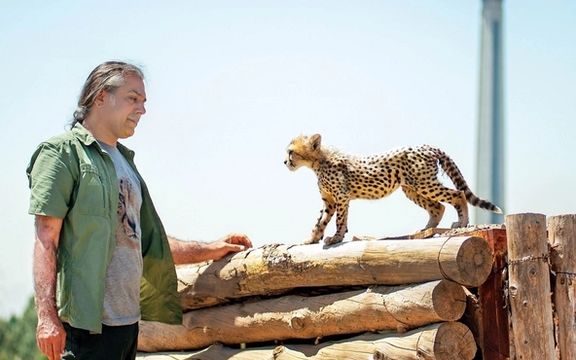
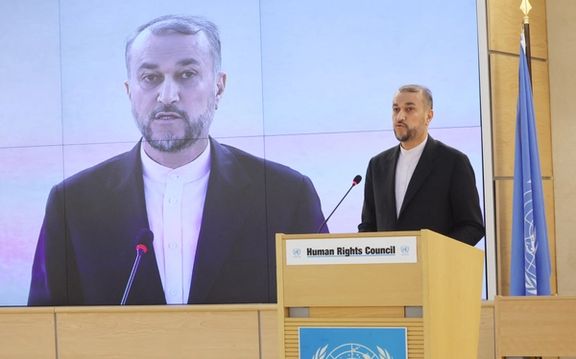
Tens of participants at the UN Human Rights Council walked out when the Islamic Republic’s foreign minister spoke at the 52nd session of the body on Monday.
Many seats were empty while Hossein-Amir Abdollahian was delivering his speech at UHRC’s headquarters in Geneva, following calls by activists urging delegates to walk out in reaction to the regime’s gross human rights violations, especially during the ongoing crackdown on antigovernment protests.
The current session of the council, made up of 47 member countries, will last for more than five weeks and is set to tackle an extensive array of human rights issues, including discrimination and freedom of religion, both major issues in Iran.
The council was one of the first international bodies to react to the current wave of protests, ignited by the death of Mahsa Amini in custody of hijab police. In November, the council voted to launch an independent investigation into the regime’s deadly repression, which has killed more than 500 civilians, including 70 children.
Most participants who left the hall in protest to Amir-Abdollahian's presence were members of NGOs as most diplomats preferred to stay and listen to the Islamic Republic’s rhetoric.
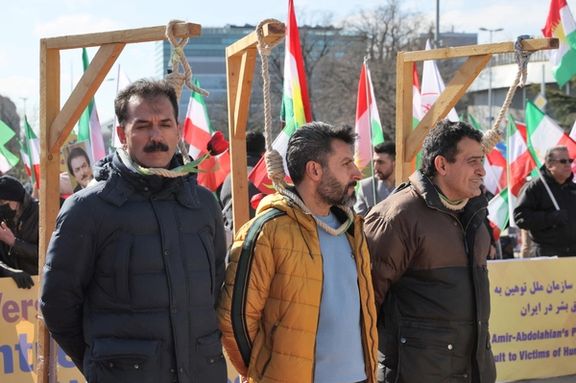
Trying to manipulate the realities on the ground, the Iranian FM said, “The peaceful assemblies that took place in my country following the sad death of Mahsa Amini... turned violent following the malign interference by some terrorist elements. In this respect, a number of Persian language TV channels based in the US and the UK, acted as provocateurs of hatred and propagators of violence.”
He also claimed that an investigation was ongoing and that all the people that were arrested during the protests have been released. He also claimed that "no one has been killed," in response to Iran International’s correspondent who asked him about the Islamic Republic's killing of protesters including a 10-year-old kid.
Outraged by Amir-Abdollahian's presence, many politicians and activists expressed concern about the UN’s move to invite the Iranian official for the opening day of the five-week session. Member of the Swedish parliament, Alireza Akhondi, said, “It’s a shameful day for the UN that they allowed representatives for a murderous regime to speak here about human rights.”
“I’m expecting that they (the UN) are redrawing their badges and they are not allowing them to enter this building anymore. Because they are not respecting the human rights of anybody and they are trying to harass and make the Iranian voices to not be able to be heard,” he added.
The foreign minister’s presence was not the only issue of contention among Iranian and foreign activists as he also held several meetings on the sidelines of the UN session, such as a meeting with the UN Secretary-General António Guterres, Belgian Foreign Minister Hadja Lahbib and Finnish Foreign Minister Pekka Haavisto.
The meetings shocked social media users, especially because Lahbib cut their hair in the country’s parliament in solidarity with anti-government demonstrations. Her meeting was criticized by many activists and officials, including Belgian lawmaker Darya Safai, who pointed out that “The Belgian government goes along with hostage diplomacy.” Lahbib herself tweeted about the release of Olivier Vandecasteele, an aid worker and a former employee of the Norwegian Refugee Council sentenced to 40 years in prison in Iran. Some believe her meeting with Amir-Abdollahian was probably an attempt to plead for his release.
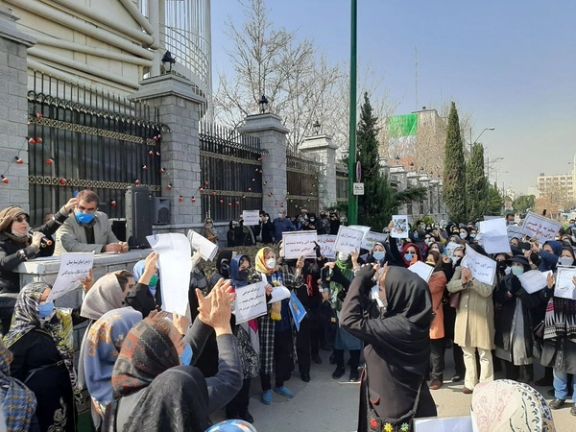
As the strikes and protest gatherings of various guilds as well as retirees continue in Iran, teachers’ main union has issued a statement calling on retirees and others to hold gatherings on Tuesday.
Referring to the ever-increasing inflation and the inability of officials to control prices and the decrease in people's purchasing power, the Coordination Council of Iranian Teachers' Trade Associations called on all "retired and working colleagues" to participate in the gathering.
Telecommunications retirees on Monday gathered in Esfahan, Sanandaj, Arak, Bandar Abbas, Kermanshah, and Khorramabad to protest the government’s inattention to their demands as inflation soars and their pensions remain unchanged.
Iran witnessed another wave of daily protests and strikes Sunday, as its currency sank leaving ordinary people to wonder how they can afford minimum necessities.
Bakers held a gathering in Tehran, while workers of Haft-Tappeh Sugarcane complex in the southwestern Khuzestan province, the Esfahan Steel Company in central Iran, and workers in several southern cities, where most of oil and gas companies are located, were on strike.
The steel company’s strike, which started Saturday, continued Sunday while security forces used water cannons to disperse the protesting workers. On Monday there were reports workers being arrested.
The company, called Zob Ahan in Persian, is directly controlled by the country’s Ministry of Industries and Mines, and is Iran's third largest steel producer and is the largest factory producing steel for construction.
In some other cities of the oil-rich province such as Shush, Shushtar, and Dezful as well as the central city of Kerman, pensioners held rallies and chanted slogans.